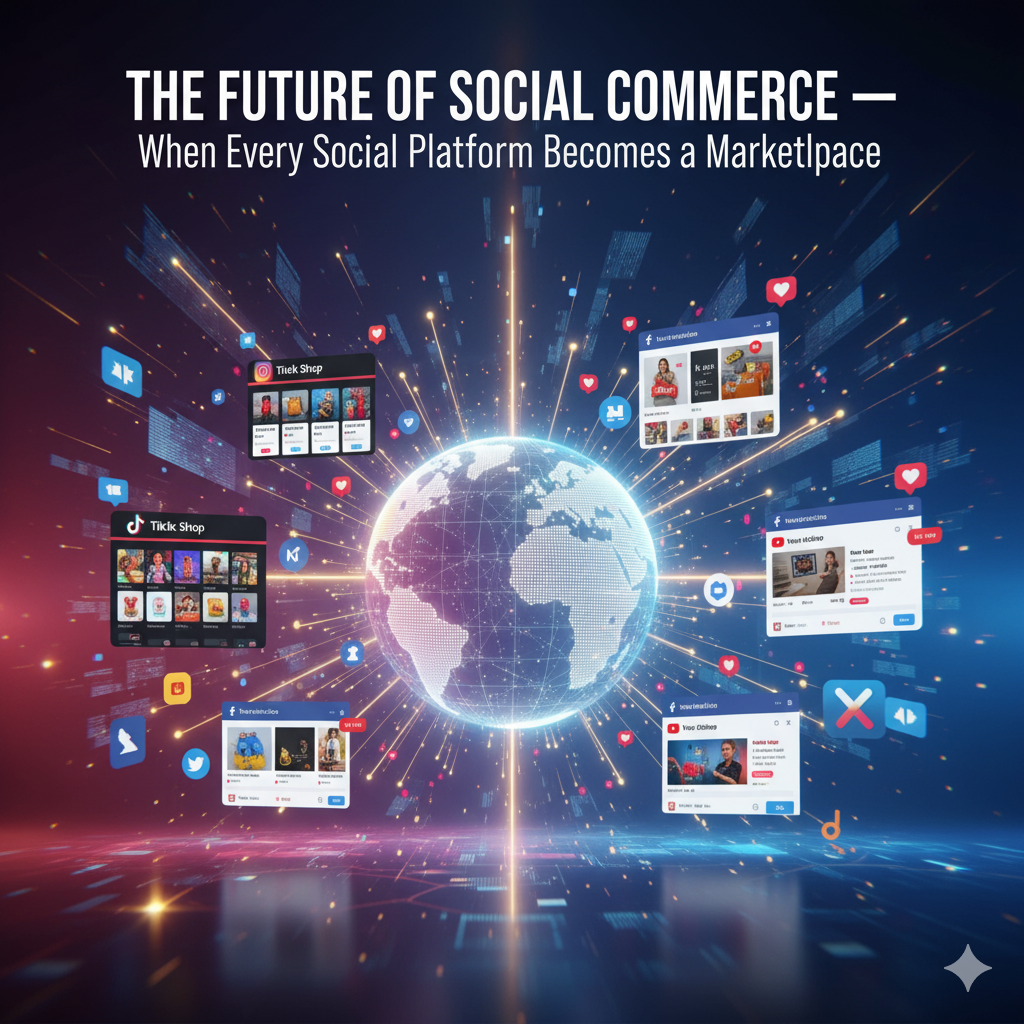
The Future of Social Commerce - When Every Social Platform Becomes a Marketplace
Introduction
Over the past decade, the way people shop has undergone a dramatic transformation. What used to require visiting a physical store or even navigating through e-commerce websites can now be done with just a few taps on a smartphone. This major shift is being driven by social commerce — the integration of shopping experiences directly into social media platforms.
📌 1. What Is Social Commerce?
Social commerce is a form of online shopping that allows users to discover, research, and purchase products or services directly through social media. Unlike traditional e-commerce, which redirects users to a separate website, social commerce integrates the entire buying journey — from discovery to checkout — inside the social platform itself.
Platforms like Instagram (with “Shop” tabs and product tags), TikTok (with in-app shopping features and live shopping), Facebook (with Marketplace and Shop integrations), and YouTube (with product pins in livestreams) are redefining how commerce works.
🧭 2. Why Social Commerce Matters
This evolution isn’t just a trend — it’s a fundamental change in consumer behavior and digital marketing strategy. Here’s why:
- Frictionless shopping: Users don’t have to leave the app to make a purchase, reducing cart abandonment.
- Higher engagement: Social networks use algorithms to push products users are genuinely interested in.
- Social proof drives trust: Reviews, likes, comments, and influencer endorsements boost credibility.
- Emotional connection: Storytelling through social media creates deeper relationships with brands.
🚀 3. How Brands Are Leveraging Social Commerce
Many businesses, from small startups to global brands, are using social commerce to reach customers more effectively. For example:
- Running live shopping events where viewers can buy products instantly.
- Partnering with influencers to increase reach and trust.
- Using in-app ads and shop integrations to convert engagement into sales.
- Creating interactive product demos, tutorials, or unboxing videos to enhance customer experience.
This strategy allows brands to shorten the sales funnel and increase conversions. Instead of making potential customers go through multiple pages and checkout steps, they can convert them directly on the platform.
🌍 4. Global Opportunities and Market Expansion
Social commerce breaks geographical barriers. A small business in Vietnam can easily sell to customers in the U.S. or Europe through targeted ads, global shipping, and multilingual content. With the right Social Media Marketing (SMM) strategies, even individuals can turn personal brands into global businesses.
As more consumers trust recommendations and content shared on social media, this channel becomes a strategic sales engine rather than just a branding tool.
🧠 5. The Role of SMM in Social Commerce
SMM plays a crucial role in turning social platforms into sales platforms. A solid SMM strategy ensures that content is optimized for discovery, engagement, and conversion. It involves:
- Content creation & storytelling.
- Audience targeting & retargeting.
- Engagement campaigns & trust-building.
- Analytics and performance tracking.
🔮 6. The Future: Social Platforms = Marketplaces
In the near future, it’s expected that most major social networks will fully integrate marketplace features. This means businesses must rethink how they approach marketing — not just as content distribution but as direct sales enablement.
Live shopping, AR/VR try-ons, AI recommendations, and personalized shopping journeys are all becoming key components of this evolution.
💡 7. Pro Tips for Brands Entering Social Commerce
- Invest in building a loyal community, not just one-time buyers.
- Use storytelling to make your product stand out emotionally.
- Leverage influencer partnerships for faster trust building.
- Optimize your content for mobile-first experiences.
- Track KPIs like conversion rate, engagement rate, and retention to refine strategy.
👉 Conclusion
Social commerce isn’t just an addition to digital marketing — it’s the future of e-commerce itself. Brands that understand how to integrate SMM with social shopping features will have a massive advantage in reaching, converting, and retaining global audiences.
📌 Visit Us: STABLESMP.COM
Suggested Keywords:
- Stable SMP
- social media panel
- SMM services
- social media marketing
- SMM reseller panel
- buy social media services
- social media growth
- increase social media engagement
- social media management
- affordable SMM panel
Date: 09/10/2025